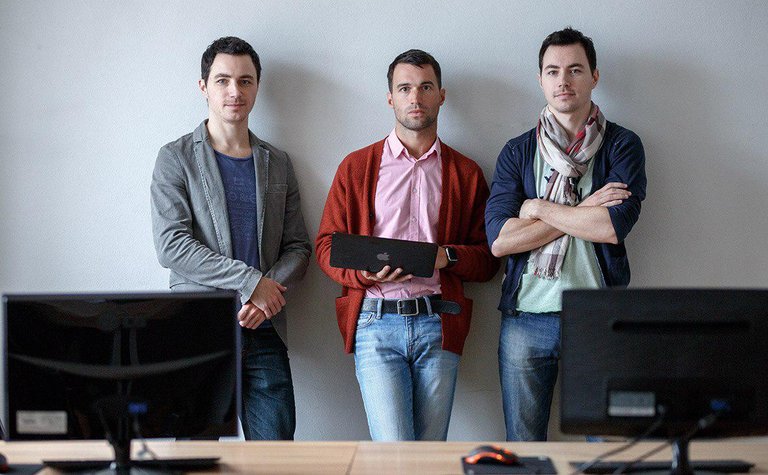
“That looks like a nice project, like anti-Photoshop and everything, you know, can be used by insurance guys and whatever…”. That was a kind of talk I heard in 2013 from some of my colleagues at Flint Capital where I worked as PR Director. The project did look promising, and management of the fund even scheduled a meeting with its founders which I probably missed due to some routine stuff. So, there is right time for everything, and I met them five years later.
And now we are getting together in Saint Petersburg. The team is spread around the world with a majority of developers residing in Vienna, Berlin and London but we got lucky as Sum&Substance came to open a new office for the company’s East European branch, located in a mysterious courtyard right next to the Moscovsky Railway Central. We quickly observed the venue and went to have a cup of coffee in the nearest rooftop restaurant.
Office works are run under supervision of Sum&Substance CEO Andrey Severyukhin and his two brothers, twins Jacob and Peter.
Just a brief illustration of how our conversation looked like.
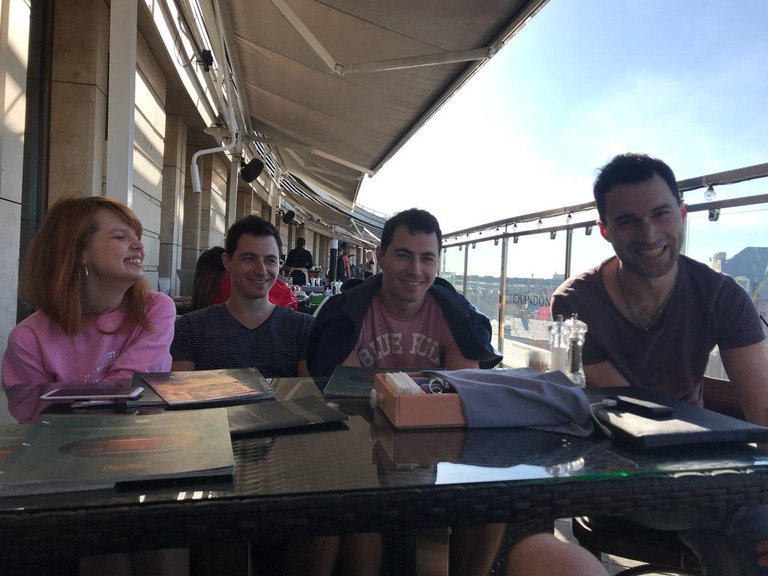
We spent nearly 1.5 hours talking. This was no ordinary discussion to be used for a boring interview; the guys were gushing with jokes and side thought which led to plenty of my own associations. Many stories didn’t make into the interview as they are not to be publicly disclosed.
Just another St. Pete summer day – the sun was shining and the weather was sweat
Sum&Substance is a great name for this company. Simply because it’s clear from the very first look: these guys are one close-knit team. And their total far exceeds the simple sum-of-parts. So, we have three handsome brothers with Andrey clearly playing the lead role.
As we passed the courtyards and streets, Andrey’s phone was ringing almost constantly. “Currently we are running KYC for all car-sharing projects in the CIS, and with this business there is always something going wrong,” he explained. All car-sharing project! Just listed to the sound of it…
Andrey Severyukhin: We are on the same page with the funds who invested in us. All Sum&Substance equity holders have their good expertise of the market and are very good with numbers. Obviously, every once in awhile they ask for another report or review, and this is totally fine. It is interesting that the funds are typical Warren Buffett with his toll bridge: they keep asking: “When is the monopoly?”. Well, we have one already – the East European car-sharing market is taken, case closed.
We got comfortable on the veranda squinting from the warm May Petersburg sunlight. I just could stop admiring the three brothers’ faces filled with inspiration. It’s always impressive when you see three young people running a well-established international company.
McKinsey values the global online verification market at $20bn a year. On the global scene, Gemalto, Civision&Trulioo are the key players. Anyway, all key actors agree that today the main competition is not between them but rather between new and old screening techniques.
Sofia Paskal: So how did that happen that you got to do KYC which is, most probably, among the most demanded and important services in the market; required by every ICO project? And you appear to be in the market long enough. What is the story?
Andrey Severyukhin: Well, initially we were doing image testing, verifying their digital authenticity. We developed a technology which indicated if there were any modification in the image.
It all began in 2011. I was working in one of the largest car showrooms in Saint Petersburg doing regular sales work. That was a seller’s market time: looks surprising today but the buyer had to wait in the queue for up to six months to get his new car, and supply wasn’t meeting demand by far. There were all sorts of money made around that deficit; I didn’t celebrate my 25th birthday and was already making a killing.
And the rest happened quite naturally: the first “client” was an insurance claims branch that was sitting next to us in the showroom. We noticed that insurance brokers often ask their fellow designers to cover a scratch mark or a dent on the photo. Or make the damage more obvious. As a result, soon we had a solid set of real life test samples and images in our possession. Importantly, all those pictures went through the insurance companies’ filters and passed them, including one “total write-down” car painted with 3D modelling.
Cartographic services were booming at that moment, and Google Street View was on surge. The brothers were involved with Yandex’ Ya.Gorod developing something similar to Chinese http://www.o.cn. It was planned as an integrated solution with all transportation, both passenger and cargo, animated planar visualization of all the sights. Unfortunately, they failed to find investors for that project and it had to stop.
And that’s when we saw this niche: detection of fake images. The task got clear – we needed to automate image analysis so that it was carried stream wise with elements of computer vision and machine learning. As we got to work, first orders started coming from the insurance companies. What helped us greatly is partnership with Belkasoft, which is an international company that cooperates with all major law enforcement actors around the globe including Interpol. This is the strongest player in that market led by Yuri Gubanov, the teaching professor with St.Pete’s State University’s Math & Mechanics faculty. Since that time Sum&Substance’s module is built into Belka’s product called Evidence Center. As a result, our image analysis app is used in investigation of dozens of law enforcement agents in the world.
Once a year in June, an extremely interesting event called Belka Day is taking place. It is where criminalist experts from all over the world come together to discuss all new developments and anti-criminal practices. Among other participants, there are representatives of Russian, Belorussian and Kazakhstani Ministries of Internal Affairs, national Investigation Committees and Special Services, Interpol, corporate players like Elcomsoft and Group IB, and others. Developers talk of their most up-to-date investigative tools, and security officials complain about things that they lack in everyday activities. Very interesting characters can be witnessed occasionally; they start with the following introduction: “unfortunately, we can’t disclose neither who we are, nor what organization we represent – but here is the case we ran into, no details, of cause”. And from year to year we meet each other at the gathering and, in a strange way, know each other.
KYC: How it all began
Andrey Severyukhin: Transition to KYC happened in 2015. We’ve automated KYC for Cryptopay wallet which was developed by our friends; simply took our module and added image recognition from our partners called Smart Engines.And we've been working together ever since.
That was a straight walk from that moment (I listen with a hidden laugh as the guys describe a huge effort and amount of work as if it was an evening newspaper puzzle): added face recognition and comparison, endless data sources and databases – and off we were. We’re moving around, meeting the data provides and plug them in. Recently we partnered with Swiss licensed broker Crypto Finance AG from Zug to support KYC under the Swiss legal procedures. That’s a great case since from now on our checks are equal to any legal/official check in the country.
The guys are all about that: all their achievements are “easy” and happened “just out of coincidence”. But listening to their stories I see a solid set of connections between the facts, figures, processes and events; and a lot of connections between people. All decentralized world is about communication and about using the sudden opportunities they provide. One of Andrey’s stories sounds like this:
Andrey Severyukhin: For obvious reasons, these days we are processing a large number of Asian ICOs, about 2-4 every day added to the modules. One of my friends is Asian tech entrepreneur call Allen who happens to be a creator of one of the messengers. We met by accident, just ran into each other at one of the conferences I was speaking at. And it appears that he has offices in Iran, Saudi Arabia, Japan, Vietnam and Malaysia. We agreed that he will lead our Seoul subsidiary.
The role of accident… Well, here is another example for you: we are currently working with one Austrian incubator supported by Raiffeisen and other large German and Austrian banks. They have a very compelling model: they support startups and request nothing in exchange. Their only motto is to support development of the local ecosystem, fill it with new projects and participants. When we ran through the admission, there was some misreading in the documents. From a thousand or so project, they have selected 50 or so, including ours. And when we arrived at the venue, our curating manager was stunned to see the project way far from the group stage, with its product and actual revenues. At the end they asked us: “since we can’t teach you anything, is there anything we can help with?” – and we asked to share as many useful contacts as possible, including this great scooter sharing project.
By the way, finding modified images was only the first step. Now the technology is moving on: we are talking about identifying fake documents that were modified before the scanning, i.e. catching falsified document loaded into the system. We are cooperating with several banks on that but I can’t name them as the NDAs are too strict.
Surprisingly enough, we manage to have our hand in two pots, the IT department’s and the security guys’. IT need us because of the automation we provide, and security like the fact that we check authenticity of the documents and verify if they belong to the applicant. And we have backgroundcheck service in addition to that.So, broadly speaking, we identify the person’s reliability level. This term has a very wide interpretation and every client uses different criteria of it.
About investors, relations with money and attitude for it
Andrey Severyukhin: One of our first investors was Oleg Seydak, who at that time was representing Flint Capital and later moved to Blackmoon. He made his offer during the project’s demo day in the state venture fund. Perekopskiye brothers, Ilya and Igor, were among the first as well.
Sofia Paskal: I recall this very clearly: Flint Capital’s office was next to vKontakte’s office in Moscow. And one day Oleg came to tell us that he got acquainted with the social network VP, Perekopsky. And it was Andrey Severyukhin who got them acquainted. This fellowship led to setting up a non-banking loans aggregator, Blackmoon, in 2015.
Andrey Severyukhin: And we’ve been in Veeam Software supported CEO CAMP acceleration and had a chance to meet Ratmir Timashev and had been tight with Veeam, ABRTandMangroveCapitalPartnersafter that.
For now, we’re not motivated by money making. Everything we made so far was spent to speed up further development. And investors fundraise rests in the accounts untouched. One of the most capital hungry issues is personal data protection and storage. And that’s where the majority of investors’ money goes, to legal support of that area.
Sanctions have a strong impact on us, and this goes without saying. What changed, someone may ask? There are plenty of changes! European banks got super attentive to Russia domiciled clients and companier with any Russian beneficiary ownership. Imagine that I can’t make an inter-group loan from my company to my brother’s legal entity without providing a long list of supplementary materials. This is why we started focusing on Israel – because of the regulation and due to the country’s great positioning in digital security.
We are very lucky with heat; probably this is because I survive it easily. Just recently we received an invitation to come and join a business incubator in Thailand. So why don’t we go to Bangkok? Not to rest on the beach – to work for real!
Coming back to our Russian allocation: for now we have a large portion of our development and our brains here. Otherwise, all operations are being moved to the global scope, including legal entities and billing. We retain a legal entity in Russia to cover this particular market needs.
On prospects and work nuances
Andrey Severyukhin: We went to the KYC market almost occasionally, and now this service appears to be in great demand from everyone in the market, including ICO players. And we slowly came to find ourselves in the shovel sellers’ role, servicing the gold diggers’ needs.There are many funny crossreads and interconnection in this market. For example, there is one company that is conducting an ICO to raise money for its KYC product. And, since they are in the very early product stage, that's we who does KYC for their ICO…
far, we have verified over 5 million people. Regulations are very strict and data has to be stored separately for our users from different locations. For the United States and Europe residents, we’re using Amazon data centers and local providers from the Eastern Europe, and Russian users’ data are kept in Moscow Region data center.
It is absolutely crucial that the consumer services are integrated with the KYC modules. I came to that conclusion after a floor-biting specialist called via one of the leading workers marketplaces started by defragmenting a hundred year wooden parquet with a pinch. And the electrician called to hang a chandelier had his hand visibly shaken. After working with so many clients, we have a different vision of any taxi service in the market – with the exception of one or two, they all represent a gateway to hell.
A few words on the corporate culture
Unique guys must have some unique hobbies, and this is true in Andrey’s case: he just loves reptiles. And this is why in all the company’s offices visitors are met by these magnificent creatures. Below are some tenants of the Sum&Substance’ terrariums.
The guys are unbelievable, and their pets are just the same: blaze and alive.
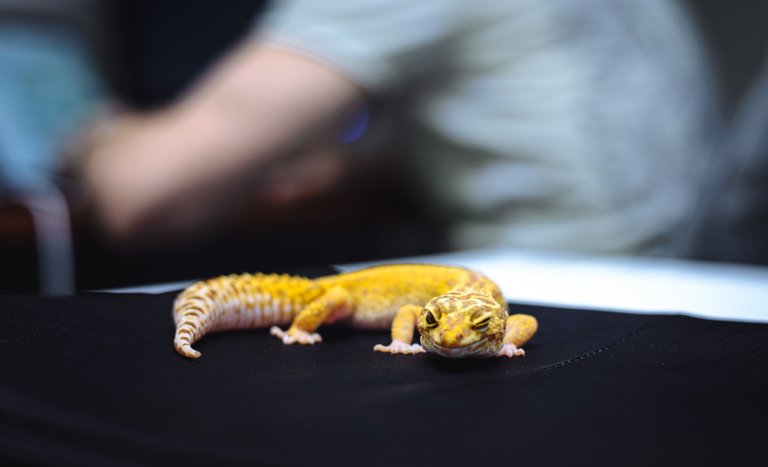
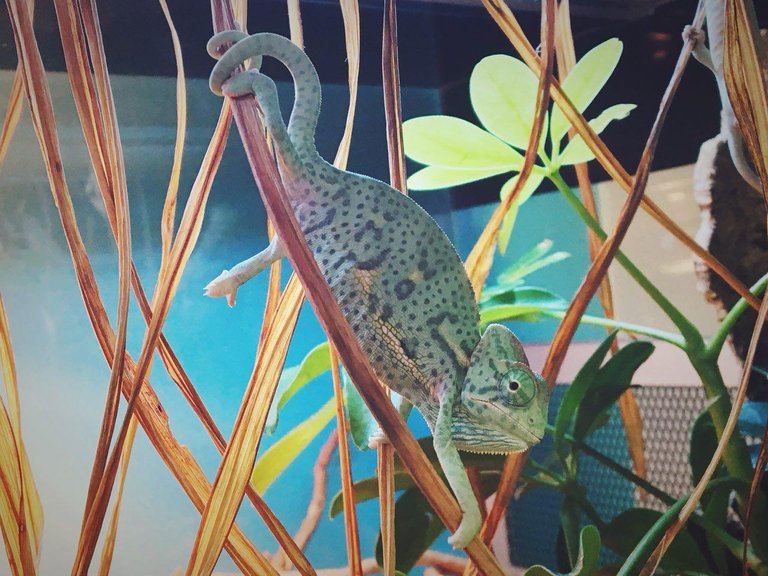

Can’t wait to get back to St. Pete, and let this happen soon!
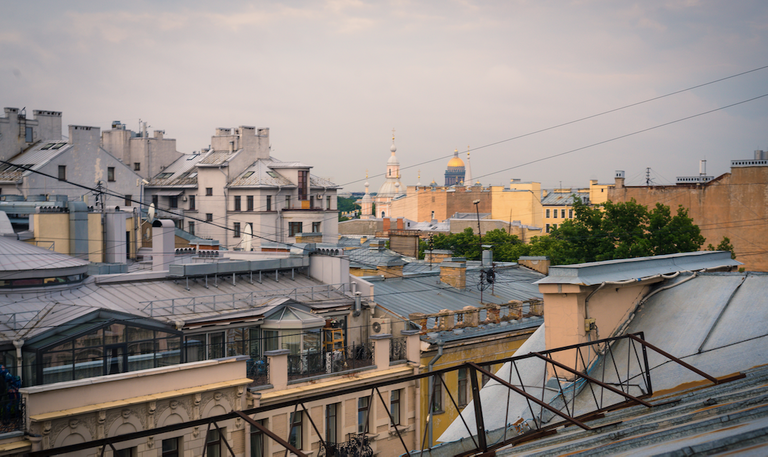
You can contact me via